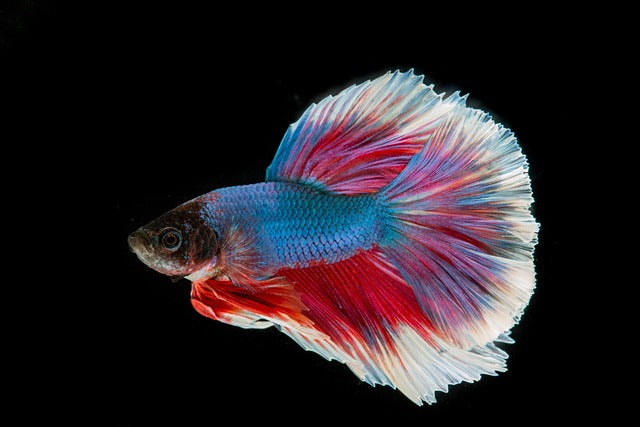
Common Health Issues of Betta Fish & How To Treat Them
The Betta fish, or Siamese Fighter Fish as it's commonly known, is a small fancy tailed tropical fish endemic to the country of Thailand. These have been bred for impressive colouration and fin displays over many centuries leading to the Betta's we know and love today.
While Betta fish make a stunning addition to any aquarium, they are unfortunately prone to several health issues which can ultimately be fatal. Appropriate, proactive care and treatment must be taken in order to give your Betta the best fighting chance.
Below we discuss the common health issues, and recommendations of treatments to prevent and overcome them.
Ichthyophthirius Multifiliis (White Spot)
White Spot (Ick) is a common issue in Siamese fighting fish, appearing as tiny white specks on the body and fins. Often triggered by stress, it’s frequently seen in imported fish.
Once introduced, it spreads rapidly and can lead to multiple deaths if not treated promptly. Under a microscope, the reason is clear—each parasite carries thousands of fast-hatching eggs.
We recommend treating with NT Labs Anti-White Spot & Fungus Treatment, following the instructions closely. Ensure good oxygen levels during treatment, as we've found this method highly effective.
**Most medications for treating White Spot require removing any carbon from your filter before use, as it can absorb the treatment. Always check the dosing instructions carefully to ensure the medication works effectively in your aquarium.
Swim Bladder Disease
Swim bladder disease as the name suggests is a serious bacterial infection (which affects all fish; however, Betta fish are particularly prone to it), making the buoyancy organ of the fish defective. This results in Betta's (or indeed any other fish) as follows:
- struggling to keep upright,
- swimming upside down
- occupying the very top/bottom of the aquarium without the ability to control this
Swim Bladder Disease is often brought about by poor water quality, but can also be caused by genetics, stress, injuries, breeding or fighting.
There is no official cure or treatment for swim bladder issues. All we can do is attempt to help the fish and hope for an internal healing of the swim bladder organ. This involves placing the Betta fish in a clean, shallow aquarium and treating it with anti-bacterial solutions such as eSHa 2000.
Fin Rot
The final issue we often see in Betta fish is Fin Rot. Like all of the above, Fin Rot can affect almost any fish, however it is more clearly visible in fish with large flowing fins such as Betta's.
Fin Rot is another bacterial based infection which leads to the destruction of fins, eating them away until they are virtually gone. It is important to not confuse fin rot with fins being damaged by other fish – An example of this would be keeping a Betta with Tiger Barbs which would persistently nip at the fins until they were severely damaged.
If left untreated, Fin Rot is often fatal. Treatment involves regular water changes and antibacterial remedies. For severe cases, we recommend methylene blue; for milder cases, aquarium tonic salt is usually effective.
Columinaris
Columnaris, often mistaken for a fungal infection, is actually a bacterial disease caused by Flavobacterium columnare. It’s highly contagious and can spread quickly, especially in tanks with poor water quality or stressed fish.
Columnaris can appear in different forms, and early identification is crucial. Common signs in Betta fish include:
- White or grayish cotton-like patches on the mouth, gills, fins, or body (often confused with fungus)
- Frayed or rotting fins
- Ulcers or sores on the body
- Mouth erosion or lesions
- Labored breathing if gills are affected
- Lethargy and loss of appetite
It often starts as a white or cloudy patch and quickly spreads if untreated.
This disease can be severe if not treated promptly, so quick action is essential at the first sign of symptoms. Lower the water temperature to around 23–24°C to slow bacterial growth and increase . Begin treatment with a course of NT Labs Disease Solve, followed by a bacterial treatment once completed. NT Labs Anti-Internal Bacteria or aquarium salt are both effective as follow-up treatments.
Keep your Betta fish healthy and thriving
In summary, Betta fish are vulnerable to the conditions discussed, as well as many other common tropical fish illnesses. If you suspect your Betta is facing a problem not covered here, feel free to reach out — we’ll do our best to help identify the issue and recommend an effective solution.
To keep your fish healthy, perform regular visual checks and test water parameters frequently. Catching problems early greatly increases the chances of successful treatment. Maintaining excellent water quality is key to preventing most issues.
Explore our expert advice, trusted treatments, and top-quality aquarium supplies today. Need help? Contact our friendly team for personalised support and recommendations!